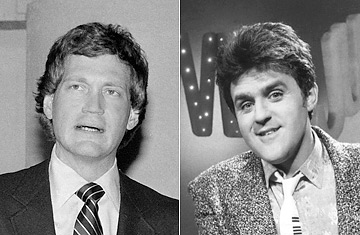
Comedians David Letterman and Jay Leno
(4 of 5)
"Mitzi called me ten minutes later and said, let's settle this thing right now," says Dreesen. On May 4 a settlement was reached, on essentially the same terms that Mitzi had rejected earlier — twenty-five dollars per set for all but a few specified hours during the week reserved for newcomers. After a six-week walkout, the Comedy Store comics went back to work, claiming victory.
The settlement was hard for Mitzi to swallow. "It was against my basic philosophy and the principles of the Comedy Store that this settlement was made," she told the Los Angeles Times's William Knoedelseder. "You might say I was unionized into a corner." Mitzi got a fig leaf of satisfaction three years later, when an administrative law judge for the National Labor Relations Board ruled that the comedians, as independent contractors, could not be unionized. "In my personal view, workman's comp, benefits — those were always in the back of Mitzi's mind as something that would break the Comedy Store," says Hamilton. "I was thrilled," Mitzi says of the ruling. "It meant they never had to pay taxes to the government."
But the strike left a bitter legacy. Some of the activists, like Leno and Dreesen, never worked in the Comedy Store again. Some who crossed the picket line later regretted it. "There were a lot of personal attacks on Mitzi, and I felt protective of her," says Mike Binder, a protégé of Leno's, who continued to work during the strike. "But it was a mistake. I didn't understand the magnitude of it. She was a bad horse to back." Mitzi, complaining that she could no longer afford to keep all her showrooms open on slow nights, shut down her Westwood club on weekdays and reduced the number of time slots at the Sunset Boulevard club — which meant less work for the comics.
Some of the strikers complained that Mitzi was taking retribution against them. One of them was Steve Lubetkin, a New York comic who had moved west and gotten close to Mitzi but wound up joining the picketers. After the comics went back to work, he complained that Mitzi would no longer give him any time slots. He appealed to Dreesen, who was getting ready to go back on the road. "He came up to me and said, Tom, don't leave; she'll retaliate. I said, she can't; it's in the contract. He said, I've called in two weeks in a row and she won't give me a time. He looked so forlorn. I grabbed his arm and said, Steve, I give you my word. I won't go back until you go back. How's that?"
Another two weeks went by, and Lubetkin still heard nothing from Mitzi. On a Friday afternoon in early June, a distraught Lubetkin walked into the Continental Hyatt House next door to the Comedy Store, climbed to the roof of the fourteen-story building, and leaped to his death. His suicide note read: "My name is Steve Lubetkin. I used to work at the Comedy Store."
